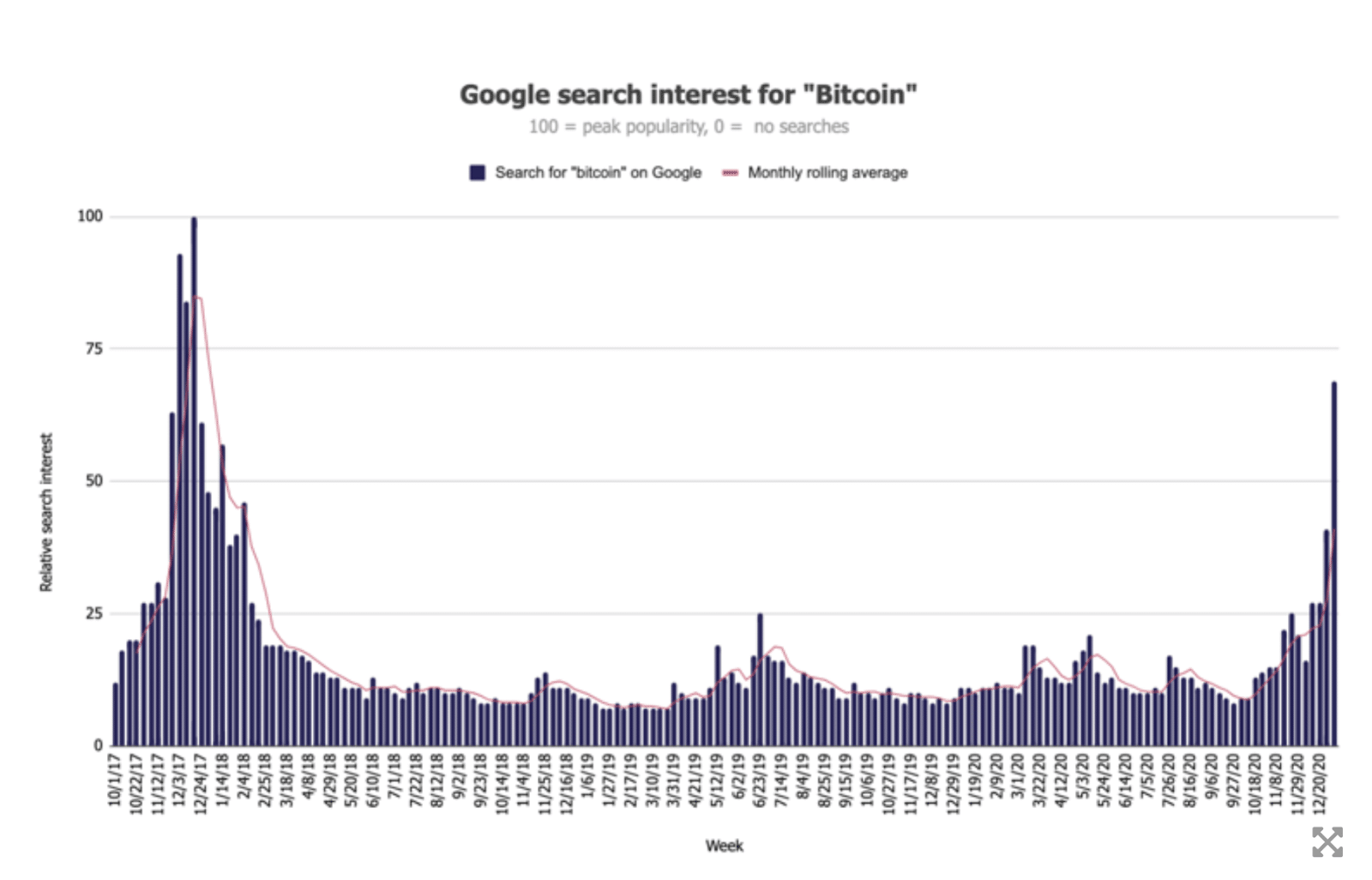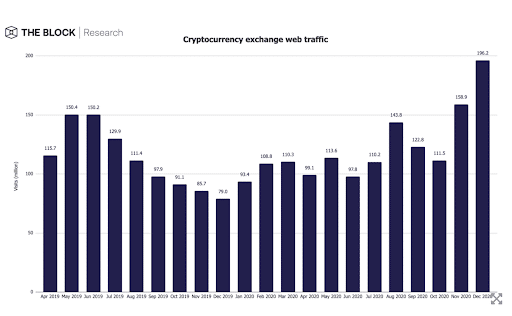+ the Bitcoin metric at a 3-year high
The week got started with Bitcoin prices spiraling down from all-time highs, only to see the price regain most of its ground by week’s end. The future looks bright for a Bitcoin ETF, thanks to Biden’s choice of SEC chairman. FinCEN is extending the comment period on its controversial new proposals regarding self-hosted wallets, which will see comments close after the current administration leaves.
Bakkt is going public ahead of its app launch, with other crypto exchanges signaling they are looking at the possibility of a Wall Street debut as well. Grayscale is finalizing the dissolution of its XRP positions, in light of the SEC’s lawsuit against Ripple, while international agencies show more leniency towards Ripple. Crypto-friendly regulator Brian Brooks stepped down from the OCC, but not before publishing, in the Financial Times, a call for federal DeFi regulation. And, Vitalik Buterin addresses the need for what he calls social recovery of wallets.
On the podcasts, Willy Woo, on-chain Bitcoin analyst breaks down what has been driving the Bitcoin price rally in recent weeks and where he thinks things are headed over the next year. And, on Unconfirmed, Meltem Demirors of Coinshares and Nic Carter of Castle Island Ventures talk about layer 2s on Bitcoin and how Bitcoin moving to layer 2s affects the value of the asset.
This Week’s Crypto News…
Bitcoin Liquidations Trigger Selloff but the Bull Run Isn’t Over
After Bitcoin saw all-time highs near $42,000 last week, the price fell below $31,000 on Monday when a series of futures liquidations sparked declines elsewhere in the market. On-chain analyst Willy Woo noted that once spot markets began their selloff, Coinbase began failing to register buys. That caused its BTC price to go $350 lower than on other exchanges. That in turn pulled down index prices that futures exchanges use to calculate leverage funding.
Synthetix founder Kain Warwick took to Twitter to offer his theory on how overleveraged longs lead to these corrections. He said that in an early bull market, long-time holders will take profits around a previous ATH. After that, however, he said they will ride the price up to multiples of the previous ATH. For example, he wrote, “I sold around 5-10% of my ETH into stables between $500-$1200, over $1,200 you would need to claw it out of my cold dead hands before we hit $3k.” The Block’s Larry Cermak pulled data showing that retail investors are dipping their toes back into the crypto markets in this rally that has so far been driven by institutional money.
Although the numbers haven’t reached 2017 levels yet, Google search interest for “Bitcoin” is at a three-year high.

Exchange traffic is also starting to pick up, with another consecutive monthly increase of 24% in December and data showing a total of 196 million website visits to crypto exchanges.

Gary Gensler Named SEC Chairman, a Move Hailed as Positive for Crypto
President-elect Joe Biden is expected to name Gary Gensler as chairman of the U.S. Securities and Exchange Commission. Gensler, a former Commodities Futures Trading Commission chairman, has testified before Congress regarding crypto and blockchain technology on several occasions and once called it “a catalyst for change in the world of finance and broader economy.” On Twitter, Compound general counsel Jake Chervinsky said Gensler’s selection signals a policy shift in favor of a Bitcoin ETF while also pointing out that Gensler was on the record in 2018, saying there was a strong case XRP is a security and so there is unlikely to be a shift in the SEC’s case against Ripple.
FinCEN Extends Comment Period on Controversial Self-Hosted Wallet Rules
The Financial Crimes Enforcement Network (FinCEN) extended its comment period for a proposed rule that would require crypto exchanges to store name and address information for customers sending more than $3,000 in crypto per day to self-hosted crypto wallets. It would also mandate that exchanges file currency transaction reports for customers whose transactions exceed $10,000 a day. On Thursday, FinCEN said it would reopen the proposed rulemaking period for an additional 15 days from January 15. The extension means that current Treasury Secretary Steven Mnuchin, largely seen as the sole driving force behind the proposed rule, will no longer be in office when comments come to a close.
Bakkt Will Go Public on NYSE Through SPAC Deal
Bakkt is going public on the New York Stock Exchange via a SPAC, or special purpose acquisition company, merging with VPC Impact Acquisition Holdings, which is backed by investment firm Victory Park Capital. The VC firm will also provide new funding, as Bakkt raises an additional $532 million. The venture is expected to have a public valuation of $2.1 billion once the merger is completed. The company also announced that it had appointed Gavin Michael, a former Citi executive, as its CEO.
The digital assets trading and payments app, which is expected to have a March launch, will allow users to buy and sell cryptocurrencies and manage other digital assets such as loyalty points and gift cards. Its regulatory filing states that Bakkt, which has more than 400,000 people preregistered ahead of its launch, hopes to reach more than 30 million customers by 2025.
The news comes as another longtime player in the crypto exchange space, Gemini, says it is considering a debut on the stock market. Gemini would be following in the footsteps of Coinbase, who filed paperwork to go public at the end of last year. According to The Block, pre-IPO futures for Coinbase on FTX are trading at $303, implying $76 billion valuation.
XRP Update
The XRP securities saga continues to play out, with digital asset investment firm Grayscale confirming in a press statement Wednesday that it is dissolving its XRP trust. This announcement comes days after the firm announced the liquidation of XRP positions from its Digital Large Cap Fund. In both cases, the catalyst was the SEC’s decision to file suit against Ripple.
However, it wasn’t all bad news for Ripple this week, with the top securities regulator in Japan saying XRP is not a security. Japan’s Financial Services Agency confirmed to The Block this week that it views XRP as a cryptocurrency and not a security.
As a side note, the XRP Army has taken to replying to SEC tweets completely unrelated to the Ripple case, with comments like, “Here in the UK, [the finance ministry] has declared XRP as an exchange token … NOT A SECURITY!!!”
An Argument for Social Recovery Wallets
Ethereum creator Vitalik Buterin published a blog post about increasing wallet security with what he called social recovery. Social Recovery is a smart contract wallet with a single “signing key” to approve transactions, as well as a set of three or more “guardians,” who can be called upon when the user loses his or her signing key. At that time, he or she would ask their guardians to sign special transactions to change the key registered in the wallet to a new one. Good suggestions for potential guardians are 1) other devices owned by the user, 2) friends and family, and 3) institutions.
As if to highlight just how useful this type of wallet would be, The New York Times came out with an article the next day about the plight of Bitcoin millionaires who have lost access to their wallet, including one who has $220 million sitting on a hardware wallet that will only give him two more tries at the password before encrypting the contents forever.
Brian Brooks Quits the OCC
Brian Brooks stepped down as acting head of the Office of the Comptroller of the Currency on Thursday. Brooks had a bold tenure as acting OCC head the last eight months and was expected to step down or be replaced by the incoming Biden administration. Brooks will be remembered for issuing several interpretive letters that cleared the way for banks to interact with cryptocurrencies, with many describing him as the nation’s “first fintech comptroller.”
On Tuesday, Brooks published an op-ed in the Financial Times calling for 21st-century regulation of emerging DeFi projects. Just as self-driving cars have appeared in the last few years and upended the ways we think about transportation, Brooks called for more clarity in federal regulation of DeFi because he expects DeFi applications to take off quickly, risking a scenario in which US states fill the void of federal regulatory clarity, impeding the development of a national market.
How a Normie Artist Became ‘Stupid Bitcoin-Rich’ and Paid It Back
Ali Spagnola, an independent artist and creator of outrageousness, as she calls herself, made a hilarious video about how she earned a bitcoin back in 2013, logged back in recently — and discovered it was worth $11,000, and then $40,000 by the time she edited and released the video. The video then details how she paid her newfound wealth back. She’s a funny character, and the story is entertaining, and even heartwarming.


